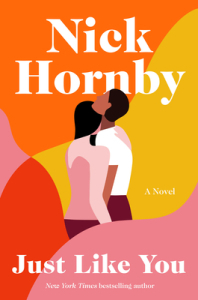Just Like You, by Nick Hornby

As always, Nick Hornby does not disappoint. I read Just Like You in a day and found it hard to put down. It’s the unlikely love story of Lucy, a middle-aged divorced English teacher and mother of two boys, and Joseph, nearly 20 years her junior, who initially is her sons’ babysitter but soon becomes much more.
There are plenty of differences between Lucy and Joseph — most obviously the 20-year age gap, which is always more shocking when the woman is the older one. There’s also a racial and cultural gap — Lucy is white; Joseph is Black. There’s a gap in their education and interests: Lucy is a teacher who loves books and the theatre, whose middle class friends are all voting to remain in the EU (the story begins in the summer before the Brexit vote, which is a recurring motif in the novel). Joseph, from a working class background, didn’t go to college, works a variety of low-paying jobs, and dreams of making it as a DJ. On the surface, they have nothing in common.
Yet Lucy and Joseph are powerfully attracted to each other, and are completely comfortable together. Where they’re not comfortable is any place outside Lucy’s house. Although attempts to socialize with Joseph’s family, with his friends, and with Lucy’s friends, all go better than either partner expects, there is no easy place for a couple as different as Lucy and Joseph to fit, and no clear path forward for their relationship.
In one of my own novels I had a character say that perhaps being with the right person doesn’t matter as much as being with someone who wants the same kind of life you do, and this is an idea that has always interested me — how much do common interest, goals, values and lifestyle weigh against romantic and sexual attraction, against the idea of “being in love”? It’s the central question of this novel: Lucy and Joseph are clearly in love, but do they belong together? Which matters more, in the end?
Another aspect of this novel that interested me is that we often talk these days about whether authors are “appropriating voice” when they write about characters whose race, gender, (dis)ability, etc, are significantly different from their own. Obviously writers can write whatever they want, but it’s also a reader’s prerogative to say, “This writer wrote in the voice of someone from my community, and frankly, I don’t feel like he did a great job.” Here, Hornby alternates points of view between a divorced woman who’s recently left an abusive marriage, and a young Black man from a working-class family. Both Lucy and Joseph have life experiences wildly different from Hornby’s own. I can’t judge how well he captured Joseph’s voice and point of view, but with Lucy, whose life experience is similar to mine in some aspects (at least being a middle-aged English teacher and mother, though not divorced from an abusive alcoholic), I feel like he captured her voice, her perspectives, and her worries very well. The whole book felt very believable and engaging to me.



